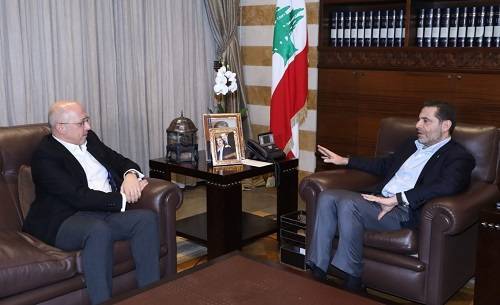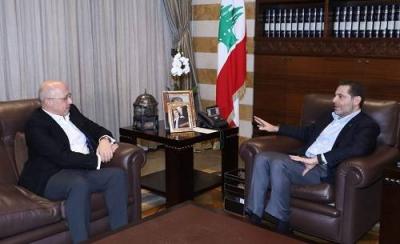Among the varied meetings held by President Saad Hariri during his time in Beirut, his reception of Alain Aoun, a member of the Strong Lebanon Bloc, stood out, especially in light of the accumulated tensions in the relationship between the Future Movement and the Free Patriotic Movement, leading to the prevailing rift between Hariri and Gibran Bassil. This context gave the meeting with Alain Aoun a special flavor, particularly after Aoun expressed a positive message to Hariri during a budget discussion session in the House of Representatives, saying: "We miss you a lot these days and we acknowledge, no matter how we disagree with you politically, your courage in opening up gaps and producing settlements in critical moments like in 2016." He added, "We miss you, and if you were here today, things would have changed a lot," according to "Al-Joumhouria."
However, is Alain Aoun's half-hour visit to Hariri a prelude to a new page between the two distant movements, or should we not read too much into it? It is clear that the meeting represents less than a new beginning and more than just a casual visit, reflecting a mix of personal and political dimensions. Despite the known disagreements and their repercussions, there exists a cordial relationship between the two men, who had also met last year on a similar occasion, away from the media.
Nevertheless, this does not mean that their repeated meetings are purely personal; they inherently carry political implications connected to Aoun's position within the movement and what Hariri represents in his environment. Ultimately, it is still early to draw far-reaching conclusions about the future of the relationship between the two movements, as long as Hariri himself has not yet retracted his decision to suspend his political activities. Therefore, the most significant aspect of his meeting with Aoun is the maintenance of a communication thread, awaiting the right moment to develop it, knowing that reconciling Hariri and Bassil is not easy and requires considerable effort and mutual steps to rebuild lost trust.
Aoun stated to "Al-Joumhouria" that his visit to Hariri was a personal initiative and not an official assignment from the leadership of the movement, noting that this does not prevent the potential use of this bridge to serve the restoration of the broader relationship between the movement and Hariri in due course, stressing that "I am not cut off from a tree, nor does Hariri ignore what I represent," while also acknowledging that the personal factor positively influenced the meeting.
He emphasizes that his initiative to visit Hariri does not contradict the movement’s principles and constants but rather aligns with them and translates them into a national action, clarifying that the Free Patriotic Movement advocates for coexistence and partnership and considers that Hariri represents one of the essential components that should not be overlooked. His return to political work is necessary to correct the imbalance in the national equation, irrespective of agreement or disagreement with him politically. Therefore, his meeting with Hariri fits into the context of those choices and convictions, indicating that maintaining this communication could pave the way for rapprochement between the two movements later.
Aoun clarifies that he will inform the bloc and the movement of the outcome of his meeting with Hariri at their first meeting. He adds, "It is true that I have my own privacy and margin, but I am not cut off from a tree."




